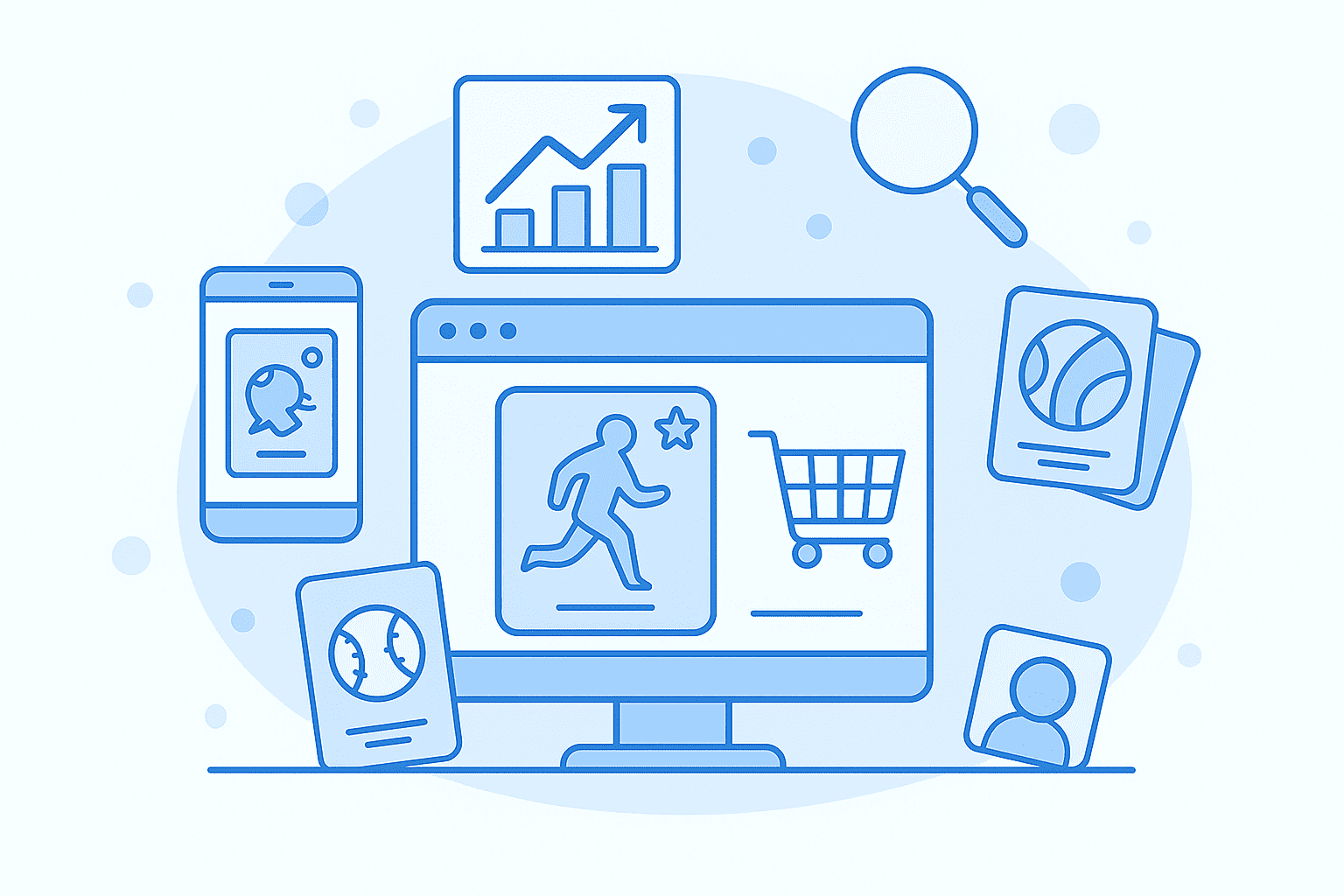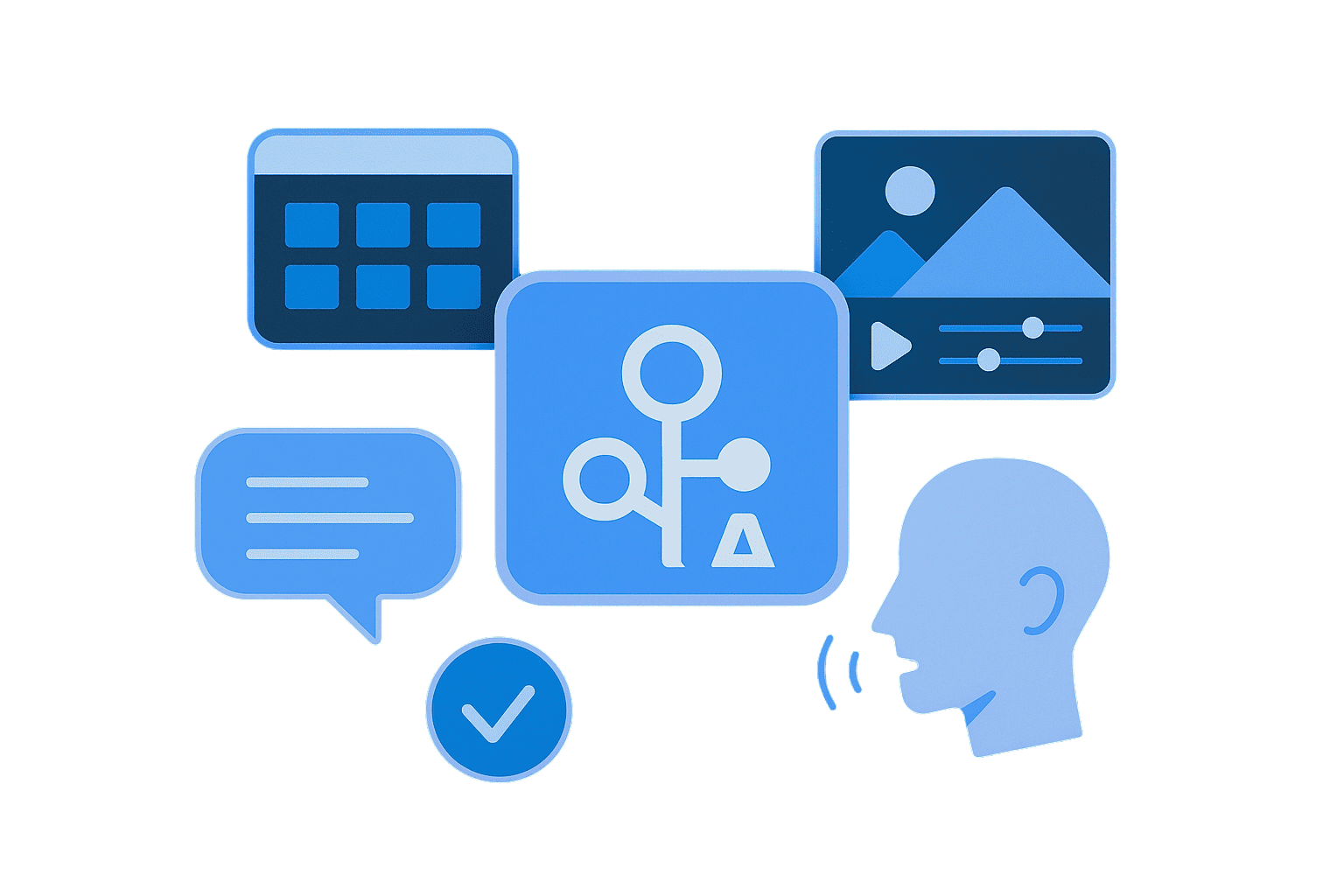What is a CRM?
What is a CRM?
Put simply, a Customer Relationship Management (CRM) system is a tool that allows businesses to manage connections with current and potential customers, as well as all of their sales-related information. It offers customer data, effective process management, and enhanced relationships that benefit any business.
There are a few core functions to any CRM, including:
- Contact Details: An all-in-one database to hold and retrieve contact information.
- Sales Management: Managing leads, deals, and communication to improve the sales process.
- Customer Support: Customer service teams must have the data to quickly get customers up and running.
- Automation: Automating repetitive jobs (email follow-ups, task assignments, etc.)
For example, a CRM system built with Festi will provide an opportunity to streamline all operations for any small business using Excel for CRM purposes. With Festi, one can get tailored solutions for everything from simple customer management to complex workflows and automation, all while avoiding the typical setbacks of running a CRM in Excel.
Who Can Use Excel as a CRM?
Small businesses with limited budgets and operational complexity remain manageable and typically depend on using Excel as a CRM system. Here are some sectors that often use Excel but could greatly benefit from transitioning to a dedicated solution:
Education and Training Providers
Educational consultancies and training providers frequently rely on CRM in Excel to manage student information, course enrollments, and payments. While this approach may work initially, these organizations soon encounter difficulties when juggling multiple courses, instructors, and students. Manual processes can lead to duplicated efforts and a higher risk of data loss.
By adopting a CRM solution like Festi, education providers can automate enrollment processes, monitor student progress, and even integrate with email marketing tools to improve communication.
Event Planners and Hospitality Services
Planners and other hospitality service providers handle numerous details, ensuring everything is well-organized. Companies use Excel for guest list management, vendor coordination, event schedules, timelines, budget tracking, and client logs. However, as the number of events and clients grows, managing large amounts of data across multiple spreadsheets becomes cumbersome and increases the potential for errors. Coordinating among team members becomes challenging since Excel lacks robust real-time collaboration features, leading to version control issues when multiple people edit the same file. Using workflow automation tools can improve real-time collaboration and reduce manual errors.
Recruiters
Recruitment agencies often handle candidate and client information through Excel for CRM. Although using Excel allows for straightforward data entry and tracking, it becomes less effective when managing larger volumes of candidates and job listings. Recruiters may miss follow-ups, misplace candidate profiles, or spend excessive time on manual updates. A CRM simplifies candidate tracking, automates reminders, and enhances team collaboration with tools like human resources systems to streamline recruitment workflows.
As a business expands or needs more advanced features—such as automation, analytics, and integration options—it might be wise to set aside from running CRM in Excel and invest in a dedicated solution to improve efficiency and manage customer relationships more effectively.
How Excel Limits Business Growth Over Time
Using Excel as a CRM might seem cost-effective, but its limitations become more pronounced as your business grows. What initially feels like a simple, straightforward tool can quickly become a bottleneck that slows down your ability to scale. One of the biggest challenges with Excel is its reliance on manual processes. As customer data increases, keeping everything organized and up to date becomes time-consuming, draining your team's productivity. What was once manageable in a small team starts to feel like an overwhelming burden.
Collaboration also becomes a significant hurdle. Excel isn't designed to handle real-time data sharing effectively, leading to confusion when multiple team members try to work on the same information. This lack of synchronization creates miscommunication and data inconsistencies, which can stifle the decision-making process. As your business grows, these inefficiencies pile up, turning what was once a simple solution into a serious obstacle to progress.
Without a more scalable system in place, these limitations can prevent your business from operating smoothly, ultimately hampering your ability to seize new opportunities and grow effectively. Now, let's dive deeper into the disadvantages of relying on Excel for CRM.
Disadvantages of Using Excel for CRM
Using Excel for CRM might initially appear to be an easy solution for managing customer information, but it has several drawbacks that could hinder your business. Here are some of the main concerns:
Limited Scalability
Excel is not an application that excels at processing loads of data. Moreover, Excel sheets quickly become cumbersome, slow, and crash easily as you expand your customer base. Additionally, large files could cause performance lags when data is being retrieved or entered.
Manual Data and Errors
The reliance on manual input often leads to data entry mistakes. Errors such as typos, improper formatting, or duplicate records can significantly impact business operations. Over time, cleaning up this data can become tedious and divert attention from essential business functions.
Inadequate Integration with Other Systems
Excel lacks integration with other business tools, like email clients, marketing platforms, or customer support systems. Data lives in silos and remains unconnected, which makes it challenging to get an integrated view of customer interactions.
No Automation for Growth
A significant drawback of Excel is its lack of automation capabilities. Small businesses that depend on Excel as a CRM for repetitive tasks like customer follow-ups, lead nurturing, or sales tracking may find these processes increasingly challenging to manage as they expand. Conversely, automated systems such as Festi's CRM provide automation features that remove the need for manual tasks, enabling your team to concentrate on more valuable activities.
Poor Collaboration Features
Excel lacks adequate real-time support for multi-user collaboration. Users who edit concurrently are likely to generate conflicting document versions and overwritten data. Sharing spreadsheets via email or shared drives can result in multiple versions of the same file, causing confusion and data discrepancies.
Security and Compliance Risks
Excel files can be easily copied, shared, and accessed by unauthorized staff, which poses significant security risks. Managing customer data in Excel makes it difficult to comply with data protection regulations like GDPR or HIPAA due to a lack of audit trails and access controls.
Inefficient Lead and Opportunity Management
Excel isn't naturally designed to provide intuitive visual representations of sales pipelines, making it difficult to grasp the status of various deals or opportunities quickly. It usually requires manual input and updates to track the progress of leads and opportunities, which results in outdated or incomplete information.
No Built-in Communication Tracking
Excel does not integrate with communication tools to automatically log emails or calls. As a result, important communication with customers may go unnoticed, leading to incomplete customer histories and missed interactions.
Advantages of CRM over Excel
Now, let's approach a CRM vs. Excel problem from another angle. The shift to a CRM can bring numerous advantages to small businesses that spreadsheets cannot match. Here are some key benefits:
Centralized Customer Information
Within a CRM system, all customers' information is housed within a single platform and available for every team member in real-time. Excel spreadsheets involve keeping multiple sheets, which is cumbersome to handle and update.
Automation and Workflow
Examples include data entry, follow-up reminders, and email outreach—all tasks that CRMs themselves can automate. This workflow automation reduces manual workload and minimizes human errors common with Excel's manual processes.
Better Customer Relationship Management
CRMs have been structured to track customer interactions, preferences, and history for the customization of communication, thereby offering better customer service. This can hardly be effectively done through Excel.
Real-time Data Update
CRM systems allow real-time data updates; hence, users get the latest information. Excel cannot do that; therefore, there are sure to be differences and inaccuracies in data.
Scalability
As the business grows, a CRM can expand with more data and users without hindering performance. Excel becomes increasingly cumbersome as data volumes grow.
Advanced Analytics and Reporting
CRM systems come with robust analytical capabilities that help understand customers' behavior, sales trends, and marketing efficiency. In contrast to CRM in Excel, which relies on manual report creation, CRMs provide real-time insights into crucial metrics such as conversion rates, lead sources, and customer lifetime value. Festi's CRM, for example, can be tailored to deliver the specific reports your business needs to thrive.
Increased Collaboration
In a CRM, multiple users can access the same information in real-time and make changes without any version control issues. When Excel files are shared among multiple users, conflicts arise that can result in overwritten data.
Integration Capabilities
CRM systems can integrate with other business tools, such as email clients, calendars, and marketing automation, smoothing workflows. Excel has minimal integration options.
Security and Compliance
CRMs ensure a high level of security for sensitive customer data and take care of compliance with data protection legislation. Excel files are more open to unauthorized access and may not meet compliance standards.
Customer Retention and Sales Growth
CRMs provide tools for effective customer engagement and automated follow-ups, helping businesses improve customer retention and drive sales growth. In contrast, Excel lacks the capabilities needed to support proactive relationship management strategies.
While using Excel for simple data organization can be convenient, a dedicated CRM system offers advanced features that boost productivity, minimize errors, and strengthen customer relationships.
Common Signs It's Time to Move from Excel to a CRM
If your business is facing any of the following issues, it's a clear indication that you've outgrown Excel as a CRM and should think about switching to a dedicated system:
Frequent data errors
Inconsistent or obsolete data
Lost or hard-to-find customer information
Lack of automation for repetitive tasks
Time-consuming manual processes
Difficulty tracking customer interactions and sales
Poor team collaboration
Limited visibility into overall business performance
If these issues resonate with you, transitioning to a custom-built CRM system might be the next step for your business growth.
CRM Adoption: Overcoming Common Myths and Misconceptions
Most small businesses are wary of implementing CRM systems due to common misconceptions that prevent the complete extraction of advantages for such a powerful tool.
CRMs Are Too Expensive
High-end CRMs come with hefty price tags, but there is no scarcity of affordable solutions catering exclusively to small-scale companies. Often, solutions such as Festi offer flexible, pay-as-you-grow pricing models, where businesses pay for only what they need.
CRMs are too Complicated
Many platforms boast intuitive, user-friendly interfaces, logical workflows, and step-by-step onboarding procedures. What is more, in most cases, CRM providers also guarantee training and support to make such a transition smooth and thus feasible even by non-technical teams.
CRMs Are Only for Large Companies
Small business firms greatly benefit from CRMs by effectively organizing customer data, automating routine tasks, and rendering better customer service.
By addressing these myths, one will find CRM systems to be highly affordable, easy to use, and quite helpful for businesses, irrespective of their size.
What to Look for in a CRM When Switching from Excel
When selecting a CRM, small businesses should consider the following key features:
User-Friendly Interface
As a small business, your team might not have the time or resources for extensive training. A CRM with an intuitive, easy-to-use interface lets your employees get up and running quickly. For example, they can easily find customer data and update information instead of wasting hours navigating complex menus. Festi excels in this area, offering a clean, simple interface that anyone on your team can master with minimal effort.
Growth Potential
As your business expands, so should your CRM. It's crucial to choose a system that can scale with your growth, handling more customers, larger data sets and increasing team collaboration. Festi is designed to grow alongside your business, ensuring you won't outgrow the system as your customer base increases.
Task Automation
Manually handling repetitive tasks like sending follow-up emails or updating contact information is not only time-consuming but also leads to errors. A CRM that automates these processes frees up your team to focus on building relationships and closing deals. Festi automates key workflows, from scheduling reminders to tracking customer interactions, saving your team valuable daily time.
Compatibility
Small businesses often rely on multiple tools for marketing, accounting, and project management. Your CRM should integrate seamlessly with these systems so you don't waste time moving data back and forth. Festi connects effortlessly with email marketing platforms, accounting software, and other critical tools, making it easy to streamline your operations without any additional hassle.
Focusing on these features ensures your CRM supports your business's current needs while preparing you for future growth. With Festi, you'll have everything you need to stay organized, efficient, and ready to scale.
Why CRM Outperforms Excel: A Feature Comparison
When selecting a CRM, small businesses should consider the following key features:
| Feature | CRM | Excel |
|---|
| Automation | High | Limited |
| Scalability | High | Limited |
| Data Management | Centralized | Decentralized |
| User Collaboration | Yes | Difficult |
| Customer Interaction Tracking | Yes | No |
| Reporting and Analytics | Automated | Manual |
| Customization | High | Limited |
| Integration with Other Tools | High | Limited |
| Security | High | Basic |
| Cost | High / Better ROI | Low / Hidden Costs |
| Ease of Use | Requires training / Consequent ease of use | Easy to use / Gets complex over time |
The table clearly indicates that CRMs surpass Excel in every aspect. CRMs are built to scale alongside your business, streamline essential processes, and offer insights that can enhance decision-making. In contrast, Excel falls short of meeting the demands of an expanding business.
CRM Integration and Customization vs. Excel's Limitations
One of the major advantages of a CRM system is the unprecedented ease of integration with the tools your business is already using. For example, integrating a CRM with email marketing tools can automatically sync customer data, enabling personalized campaigns without manual data entry. Similarly, linking it with your accounting software allows real-time access to billing information, improving accuracy and speeding up invoicing processes.
In contrast, Excel as a CRM will drastically restrict your options for system integration. As Excel is not designed for that sort of connectivity, it becomes hard, if not impossible, to connect with other software solutions. This forces you to transfer data manually, which is inefficient and increases the risk of errors when different teams in your company use different systems.
Whether it's setting up custom dashboards, automating specific tasks, or creating tailored reports, a CRM can be set up to suit your exact needs.
A dedicated CRM from Festi will integrate seamlessly with your current tools and provide advanced features for customization, allowing your business to be more functional and grow uninhibited by the specific limitations that come with Excel.
Ready to Transition to a CRM? Festi Can Help
If you want to elevate your business, it might be time to move from Excel for CRM to a more adaptable and scalable CRM system. Festi provides customizable CRM solutions designed to meet the specific needs of small businesses. Whether your goal is to automate customer interactions, enhance data management, or improve team collaboration, Festi's CRM can support you.
Interested in learning more? Schedule a consultation or demo with Festi today to discover how we can create a CRM that fits your business perfectly.
Final Thoughts
Choosing between CRM vs. Excel can be challenging for small businesses, but as your company expands, so do your data management requirements. While using Excel as a CRM may suffice for basic tasks, a more sophisticated and scalable CRM system can provide the automation, reporting, and customization necessary for efficient business growth. If you're ready to enhance your operations, consider the advantages of a dedicated CRM. You can also explore our case studies to see how other small businesses have successfully transitioned with Festi's assistance.



